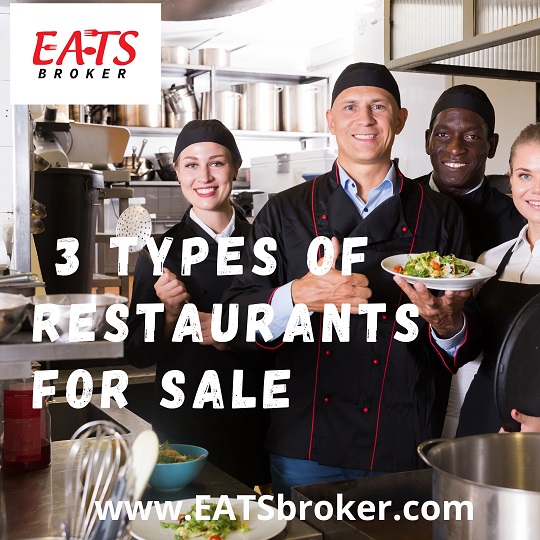The start of a new year brings an increase in the inventory of listed restaurants for sale. There are three types of Restaurants for Sale that buyers will find on the market. The difference between the three types of for-sale methods is how they are listed.
– Restaurants for Sale by a Business Broker or Restaurant Broker
-Franchise Restaurants for Sale by Franchises
– Restaurants for Sale by Owner
Restaurant Broker Dominique Maddox says, “sellers should understand the pros and cons of each method of listing a restaurant for sale. The resale of a restaurant is much different than operating a restaurant or selling a new franchise unit”.
EATS Broker discuss the Pros and Cons of these methods to Sell a Restaurant:
Restaurants for Sale by a Business Broker or Restaurant Broker- The difference between Broker types is that a Restaurant Broker specializes in selling restaurants, bars, and nightclubs. Business Brokers usually will have many different concepts for sale, for example, car wash, dry cleaners, etc.
Restaurant Brokers understand restaurant valuations, Franchise Resale process, and SBA lending requirements and have a team of professional vendors to help close deals.
On a day-to-day basis, Restaurant Brokers view restaurant Profit and Loss statements, tax returns, and balance sheets, read restaurant leases, and prequalifying buyers.
Experienced Restaurant Brokers are a valuable resource to a restaurant owner that wants to sell a restaurant.
CONS: Business Broker/Restaurant Broker will charge a commission of 10%-15% and require an exclusive listing agreement for 6-12 months.
Franchise Restaurants for Sale by Franchises
Franchise Brands are great at selling a new unit to a Franchisee but need help with reselling a franchise. Most Restaurant Franchises cannot help franchisees ready to exit the franchise system.
Restaurant Franchisors are in a challenging position trying to provide Restaurant Valuations to current franchisees. Franchise Brands have a Franchise Development Department but will not have a Restaurant Exit or Restaurant Brokerage department.
Buyers will find that some Franchise Restaurant brands will try to handle the resell process, and franchises will list their resales for sale and follow up with buyer inquiries.
Cons: The Franchise Brands represent their company’s best interest and not the seller or buyer. Restaurant owners should understand how the franchise will help with the resale process. Restaurant owners should have a legal team review all documents.
Restaurants for Sale by Owner:
Buying a Restaurant for sale by Owner can be challenging for a buyer. For Sale by Owner, listings are increasing and becoming more popular. The great news is buyers have more inventory on the market than buy and consider. The bad news is that For Sale by Owner, listings can be regarded as risky!
CONS:
Sales numbers can be hard to validate– some restaurant owners have creative accounting systems that the IRS does not know about. Buyers should use caution when verifying sales data provided by the seller.
Equipment-buyer should confirm who has the title to the equipment. The restaurant equipment can be owned by the landlord, have a UCC lien, or be leased.
Finding out the truth-Dealing directly with an owner/seller can make it hard to get the truth. There is no independent third party verifying or analyzing the information.
The old saying is, “buyers lie, and sellers lie too.”
Restaurant Broker advice: Request Tax Returns directly from the IRS and Sales Tax Receipts. Confirm that total sales numbers match.
For more information on the restaurant market and other available consulting services or a complimentary restaurant valuation, contact Texas Restaurant Broker Dominique Maddox at 404-993-4448 or email at [email protected]. Visit our website at www.EATSbroker.com.

